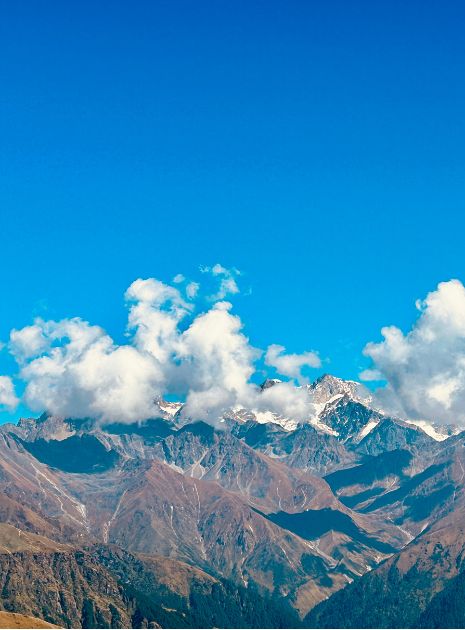Pankhu
They say some places don’t choose you, you choose them. Pankhu Top is one such place. Raised like a secret balcony above Bageshwar (बागेश्वर) and Berinag (बेरीनाग), it is a high meadow that doesn’t shout. It waits in quiet green expanses at around 3,000 meters, with views that make your breath pause and often stay.
They say some places don’t choose you, you choose them. Pankhu Top is one such place. Raised like a secret balcony above Bageshwar (बागेश्वर) and Berinag (बेरीनाग), it is a high meadow that doesn’t shout. It waits in quiet green expanses at around 3,000 meters, with views that make your breath pause and often stay.
Pankhu Top, also known as Pakhwa Bugyal (पखवा बुग्याल), sits above the gentle chaos of village life in the hills. It isn’t carved by crowds. Instead, it is held together by lingering pine (चीड़) trees, grazing bakriyan (बकरियां), and skies that stretch farther than you think possible.
Mornings here begin the moment you lift your head. Wakefulness comes with the sound of birds (पक्षी). Clouds dissolve into light. Chai (चाय) simmers in tiny homestays tucked close to the jharna (झरना). The walk up from Khati (खाती) or Jhuni (झुनी) is gradual, first via kheti (खेती) fields, then forests, and ultimately into bugyals (बुग्याल) where each blade of ghaas (घास) trembles with anticipation of dawn.
At the top, you catch sight of jagged Himalayan peaks (हिमालयी चोटियां) that dip into glaciers, the Sunderdhunga Maiktoli hills light indistinctly, and the valley below folding into itself like a back breath.
The route from Khati to Bajlingdhar (बाजलिंगधार) and then Pankhu Top is not for speed. It is for those who mind kadam (कदम) less than nazara (नज़ारा), who let the wind’s kahani (कहानी) enter their stride. The trail is easy to moderate, open to first timers and seasoned trekkers alike. Accommodations are quiet too, homestays in Jhuni and campfires under stars (तारों भरा आसमान) a top Bugyal.
Locals say “Pakhwa” means the chhat (छत) of a house. When standing in the meadow, it makes sense. You feel like you are walking a top Uttarakhand (उत्तराखंड) itself with the world spread in sloping blankets below.
At the base lies Pankhu Reserve Forest (पंखू आर.एफ.), a small gaon (गाँव) almost invisible on maps, but alive with kahaniyan (कहानियाँ). Around 60 homes, nearly 284 log (लोग), the village breathes quietly in the folds of Berinag tehsil. Through swings of barsaat (बरसात) and the hush of sardi (सर्दी), life keeps ticking. Bachche (बच्चे) run to school, buzurg (बुज़ुर्ग) tend kheti, bakriyan (बकरियां) echo in lanes still sweet with afternoon fog.
Today, some records may show only a few residents remain, perhaps ek-do (एक-दो). But if you listen, you will hear the murmur of ancestors in sloping roofs, in the tilt of doors, in whispered yaadein (यादें) over chai.
The trek crosses quite highland forests. You might glimpse a monal (मोनाल) bird’s flash, hear a deer (हिरण) slipping through undergrowth, or see gaddis (गढ़वाली चरवाहे) leading their flocks across grass that glows golden at dawn. It is both raah (राह) and shanti (शांति), sahas (साहस) and sukoon (सुकून), all carried on one breath.
In basant (बसंत), the hills bloom bright. In Sardi, they hush under snow. Garmi (गर्मी) brings butterflies and meadows. Every ritu (ऋतु) is a storyteller.
Each season carries its own paath (पाठ) of patience, wonder, and stillness.
Pankhu Top is not just about the climb. It is about turning back and spending shaam (शाम) with the people of Jhuni, over rajma (राजमा) cooked on chulha, fresh makka (मक्का), and hasi-mazaak (हंसी-मज़ाक) that arrives slow and genuine. Villagers speak not of altitude but of fasal (फसल), of bachche now in cities, of yatri (यात्री) who always come back. Their words stay like a nishaan (निशान) on your heart.
You don’t leave Pankhu Top with souvenirs. You leave with thandi hawa (ठंडी हवा) in your lungs, with ghaas-tipped jute (जूते), with breath that tastes of pahadi aakash (पहाड़ी आकाश). Ahead of you, the duniya (दुनिया) feels large. Behind, it holds a memory of quiet ridgelines, of fields taught by goats, of kuch din (कुछ दिन) that speak longer than any words.
Pankhu Top doesn’t let go easily. It lingers in silent nudges, an itch to return, to breathe again, to listen once more.
| All Sub Districts | ||
|---|---|---|
| Dharchula | Didihat | Ganai Gangoli |
| Gangolihat | Kanalichhina | Munsiari |
| Pankhu | Tejam | Thal |
| test123 | ||

Uttarakhand is not simply another country. People here name it Devbhoomi (देवभूमि), the Land of the Gods. And it feels that way. Rivers begin right he......
See Details